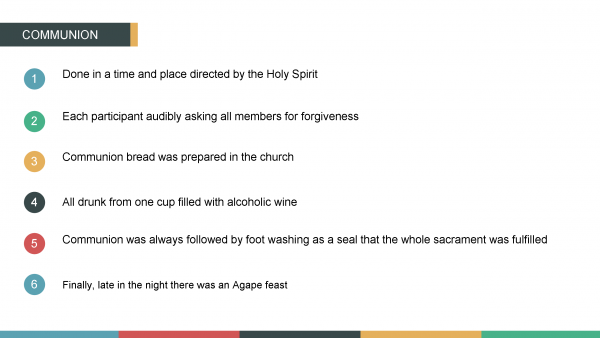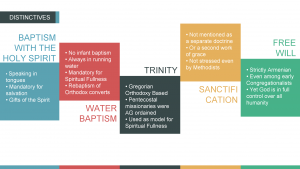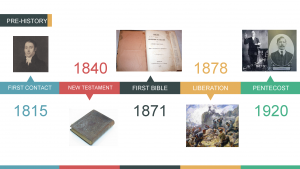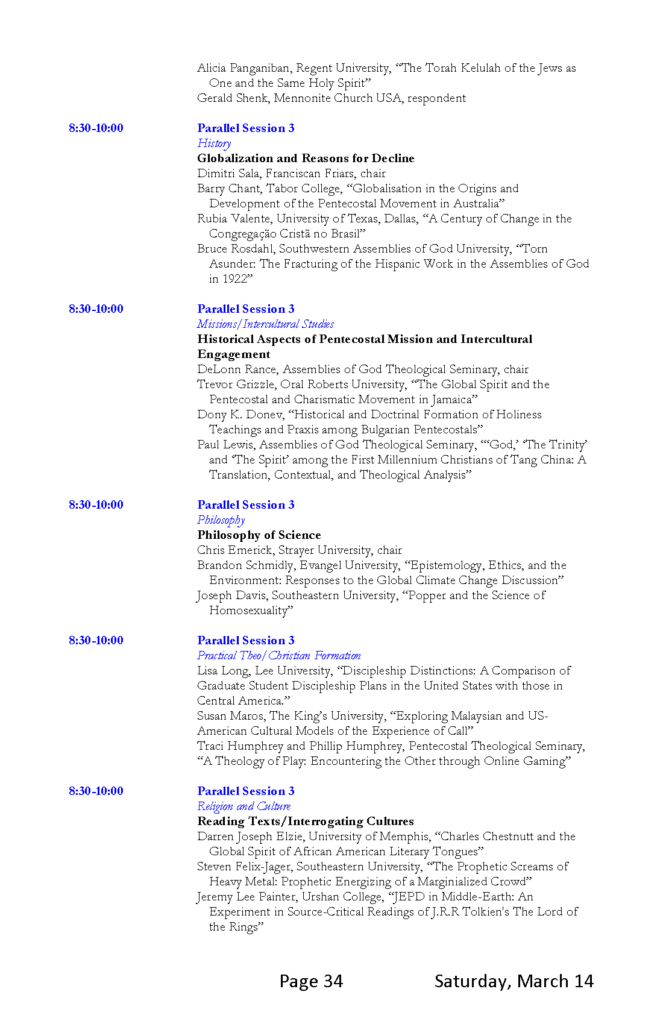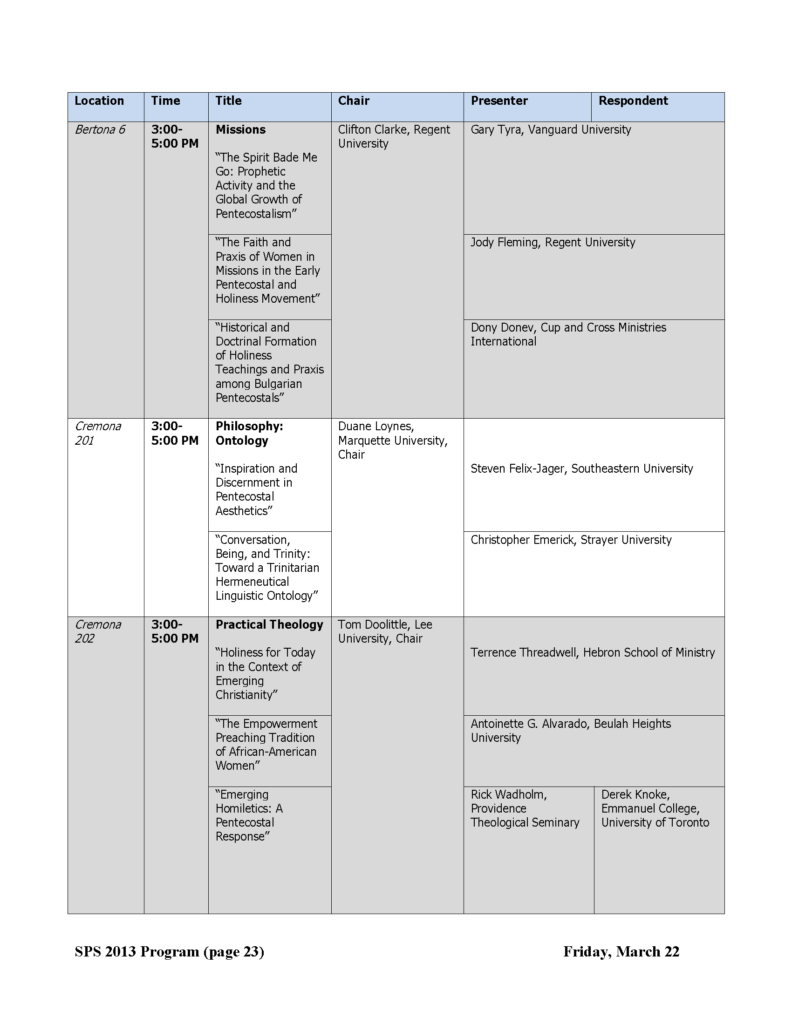Historical and Doctrinal Formation of Holiness Teachings and Praxis among Bulgarian Pentecostals
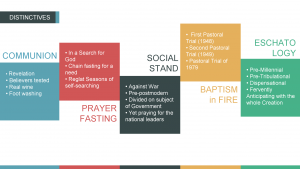 Research presentation prepared for the Society of Pentecostal Studies, Seattle, 2013 – Lakeland, 2015, thesis in partial fulfillment of the degree of D. Phil., Trinity College
Research presentation prepared for the Society of Pentecostal Studies, Seattle, 2013 – Lakeland, 2015, thesis in partial fulfillment of the degree of D. Phil., Trinity College
In conclusion, it must be noted that like many other places around the world, Bulgarian Pentecostalism began and continues to be in the periphery of both social and religious life. The movement has been persecuted as new, extreme, outcast and even satanic, but in the end Pentecostalism prevailed from the periphery. The only problem with holding strong in the periphery of society is that you spend all your money, all your time, all your motivation, everything you have to change the center – to change reality itself. It demands an extreme internal passion to continue and to become a movement of social influence. For the external observer this makes no sense. The time and resources spent could be so much helpful somewhere else. Perhaps, in an environment that is more suitable for the center – more controlled by the center. And an environment that does not make the center look bad.
But when this environment is not the center itself, then the periphery becomes a public enemy to the centralized society and is discarded as crazy, obscene and even inhumane. To the point that after giving it all, you start to feel like it was all spent for nothing.
Then you get back to the mission that is more important than our feelings or emotions and convince yourself with all you have left, that the end result is worthy. And then one day you wake up in the center of reality. Even more, you become the center of reality.
And the question remaining is how to balance the center with the periphery. If we were always in the center of culture, religion and economics, we would have never heard the voice of the God of the periphery. The God of the enslaved, oppressed, persecuted, poor, sick and suffering – God of the miraculous…
Pacifism as a Social Stand for Holiness among Early Bulgarian Pentecostals
 Historical and Doctrinal Formation of Holiness Teachings and Praxis among Bulgarian Pentecostals (Research presentation prepared for the Society of Pentecostal Studies, Seattle, 2013 – Lakeland, 2015, thesis in partial fulfillment of the degree of D. Phil., Trinity College)
Historical and Doctrinal Formation of Holiness Teachings and Praxis among Bulgarian Pentecostals (Research presentation prepared for the Society of Pentecostal Studies, Seattle, 2013 – Lakeland, 2015, thesis in partial fulfillment of the degree of D. Phil., Trinity College)
When Pentecostalism began to spread rapidly in Bulgaria in the 1920s, it was viewed hostile as by both Protestant and Orthodox traditions. Not fasting during lent and not sacrificing for the dead, not honoring Mary or the saints was all detrimental in the formation of the identity of Pentecostal churches in Bulgaria. Even insignificant things like not wearing a cross, or not making the sign of the cross and not lighting candles and incense were noticed and severely criticized by the surrounding culture. And of course not drinking alcohol in Bulgaria and the Pentecostal abstinence was met with enormous opposition from other religious groups. Along with that any benevolence, social involvement, spiritual upbringing of minors (including sport actives) was all condemned as harmful protestant propaganda.
But one specific evangelical stand could never be forgiven – the protestant pacifism in the form of conscientious objection against carrying arms. For the newly re-born Balkan state, in a place where war has been ongoing for centuries, to refusal to go to war was essentially to refuse to be a Bulgarian.
The pacifism of Bulgaria’s evangelicals was silent but powerful against both Hitler’s fascism and the militant atheism of the coming Communist Regime. Their deep Christian conviction simply did not allow them to kill, carry a weapon, imprison another human being, swear allegiance to the communist state or take orders from another authority but God. And for their stand, many ministers and believers paid a heavy price. About 40 ministers and members of the Bulgarian Church of God alone were sentenced to hard prison labor for noncompliance with the mandatory military service. Hundreds more known and unknown believers from other evangelical churches followed.
The Practice of Corporate Holiness within the Communion Service of Bulgarian Pentecostals
by Dony K. Donev, D.Min.
Historical and Doctrinal Formation of Holiness Teachings and Praxis among Bulgarian Pentecostals (Research presentation prepared for the Society of Pentecostal Studies, Seattle, 2013 – Lakeland, 2015, thesis in partial fulfillment of the degree of D. Phil., Trinity College)
Pentecostal identity was corporately practiced and celebrated within the fellowship of believers through the partaking of Holy Communion. We have otherwise extensively described the Communion service among Bulgaria’s conservatives in Theology of the Persecuted Church (Part 1: Lord’s Supper https://cupandcross.com/theology-of-the-persecuted-church/). Therefore, here we offer just a brief overview of its main characteristics.
- It was done in a time and place directed by the Holy Spirit
- If some did not have water baptism they were taken to a close by river to be baptized while the rest of the church prayed
- Upon returning, if some did not have yet the baptism with the Holy Spirit, the church would pray until all were baptized
- It began with each participant audibly asking all members for forgiveness
- they would also audible respond with the words: WE FORGIVE YOU and may GOD also forgive you
- The communion bread was prepared on the spot baked by women whose names were also reveled in prayer
- All drank from one cup, which strangely for their strict practice of abstinence from alcohol, was filled with alcoholic wine
- Communion was served only to those who had the fullness of the Spirit, and had just requested and were given forgiveness
- The presbyter would quote Jude 20 to each partaking believer thus directing them to audibly speak in tongues before they could participate in communion
- Interpretation often followed to confirm the spiritual stand of the believer
- If there were any leftovers, the Communion elements were served again until all was used
- Communion was incomplete without foot washing as a seal that the whole sacrament was fulfilled.
Sanctification and Personal Holiness among Early Bulgarian Pentecostals
Historical and Doctrinal Formation of Holiness Teachings and Praxis among Bulgarian Pentecostals (Research presentation prepared for the Society of Pentecostal Studies, Seattle, 2013 – Lakeland, 2015, thesis in partial fulfillment of the degree of D. Phil., Trinity College)
With all said about the importance of Spirit baptism and the importance of the Trinity in the Pentecostal experience of the believer, it comes as a great surprise that sanctification was never mentioned as a specific doctrine among early Bulgarian Pentecostals. Voronaev’s teaching included: (1) salvation through new birth, (2) baptism with the Holy Spirit, (3) healing and (4) the second return of Christ. Sanctification was never specifically mentioned as a separate doctrine.
To this day, sanctification is not an official doctrine for the Evangelical Methodist Episcopal Church of Bulgaria. In 1928, Bulgaria’s Pentecostal Union also included holiness as number ten in their first bylaws. Sanctification was not defined as a second work of grace, but as a “continuous life of holiness”. With the enormous theological Methodist influence, it is astounding that the doctrine of sanctification was never taught as a separate work of grace. Even when after Pentecostalism spread in Bulgaria, it was not included in the tri-fold formula for “spiritual fullness” of the believer.
Nevertheless, the search for a deeper spirituality was always there. When liberal theology entered Bulgaria in the beginning of the 20th century, the more conservative believers were forced to separate from the larger city congregations into home services and cottage meetings.
These small communities were enclosed, but easily identified by their extreme personal asceticism. There was no use of instruments in worship, no denominational structure and a distinct social disengagement from the world. Men shaved their heads completely and grew long mustaches. They wore no dress ties, because they pointed downward toward hell. Women wore head coverings as a sign for the angels both within and outside church services. Even the mother of Bulgaria’s Pentecostalism, Olga Zaplishny, who was college educated and spent years in the United States wore a head cover and enforced all ladies to follow her example.
Doctrine of the Trinity among Early Bulgarian Pentecostals
Historical and Doctrinal Formation of Holiness Teachings and Praxis among Bulgarian Pentecostals (Research presentation prepared for the Society of Pentecostal Studies, Seattle, 2013 – Lakeland, 2015, thesis in partial fulfillment of the degree of D. Phil., Trinity College)
The Doctrine of the Trinity was not foreign for the Eastern Orthodox mindset of the first Bulgarian Pentecostals. They grew in a spiritual context where eastern pneumotology historically promoted the graduate process of theism development, with the Spirit being involved in both original creation of the world and the new-birth of the believer. For them, God’s work did not end there, but continued throughout a process of personal sanctification of the believer. This gradual process would have the same triune characteristics as of the triune God, providing the believer an experience with each person of the Trinity.
The historically inherited value of the Trinity is evident in the Bylaws of the Pentecostal Union where it was listed second only to the verbal inspiration of the Bible. As ordained Assemblies of God ministers, both Zaplishny and Voronaev subscribed to the 1916 Statement of Fundamental Truths, which resolved the “oneness controversy” and because of that were unquestionably Trinitarian. All documents from the time period prove that the movement they started in Eastern Europe followed their theological teachings.
Water Baptism among early Bulgarian Pentecostals
Historical and Doctrinal Formation of Holiness Teachings and Praxis among Bulgarian Pentecostals (Research presentation prepared for the Society of Pentecostal Studies, Seattle, 2013 – Lakeland, 2015, thesis in partial fulfillment of the degree of D. Phil., Trinity College)
The sacrament of water baptism was not new for Bulgarian believers. But Pentecostals did NOT accept infant baptism. Converts who were baptized as babies or any other Eastern Orthodox ritual were re-baptized before being received in the church. Among early Bulgarian Pentecostals, baptism was always done outside in “running water.” It was also considered mandatory for salvation as Bulgaria’s early Pentecostals insisted on spiritual fullness including: (1) salvation, (2) water baptism and (3) baptism with the Spirit. This formula of spiritual experience satisfied the witness of blood, water and Spirit (1 Jn. 5:8) on earth and corresponded with the triune God in heaven (1 Jn. 5:7), from whom the believer’s spiritual experience originated.
Historical and Doctrinal Formation of Holiness Teachings and Praxis among Bulgarian Pentecostals
by Dony K. Donev, D.Min.
Historical and Doctrinal Formation of Holiness Teachings and Praxis among Bulgarian Pentecostals (Research presentation prepared for the Society of Pentecostal Studies, Seattle, 2013 – Lakeland, 2015, thesis in partial fulfillment of the degree of D. Phil., Trinity College)
Protestant work in Bulgaria began in 1815 when agents of British and Foreign Bible Society, Robert Pinkerton (1780-1859) and Benjamin Barker (d.1859), initiated a search for Bible translators in the spoken Bulgarian vernacular. As a result a new translation of the New Testament in Bulgaria was published in 1840 and the whole Bible in 1871.
By the liberation of Bulgaria from Turkish Yoke in 1878 Protestantism was well established in Bulgaria. Graduates from Protestant Robert’s College became prominent politicians in the new Bulgarian state. When the first Pentecostal missionaries arrived in 1920, they found a century old protestant tradition in Bulgaria.
Presenting at the Society for Pentecostal Studies in Southeastern University on “Historical and Doctrinal Formation of Holiness Teachings and Praxis among Bulgarian Pentecostals” (Part 2)
January 25, 2015 by Cup&Cross
Filed under News, Publication, Research
Presenting at the Society for Pentecostal Studies in Southeastern University on “Historical and Doctrinal Formation of Holiness Teachings and Praxis among Bulgarian Pentecostals” (Part 2)
Are Pentecostals offering Strange Fire?
Comments Off on Are Pentecostals offering Strange Fire?
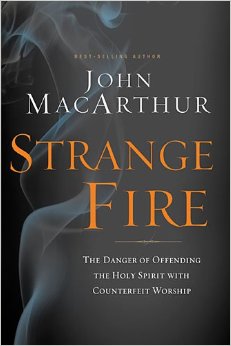 Did tongues and the supernatural gifts of the Holy Spirit cease in the early church? John MacArthur says they did and that practicing them today is false worship—an abomination before God. Pneuma Review invites you to respond to these criticisms and to renew the biblical command to “desire spiritual gifts” (1 Cor 14:1).
Did tongues and the supernatural gifts of the Holy Spirit cease in the early church? John MacArthur says they did and that practicing them today is false worship—an abomination before God. Pneuma Review invites you to respond to these criticisms and to renew the biblical command to “desire spiritual gifts” (1 Cor 14:1).
We’ve been here before
In 1978, MacArthur wrote The Charismatics: A Doctrinal Perspective (Zondervan). Charismatic Chaos (Zondervan) was published in 1992. Dr. MacArthur launched his latest attacks against Pentecostal/charismatic beliefs with the Strange Fire conference (October 16-18, 2013), with speakers including Joni Eareckson-Tada and R. C. Sproul. His new book is Strange Fire: The Danger of Offending the Holy Spirit with Counterfeit Worship (Thomas Nelson), due out on November 12, 2013.
Not known for a conciliatory approach, John MacArthur’s inflammatory language is sure to polarize any attempt by Christians to discuss the gifts of the Spirit. We all agree that spiritual gifts can be and have been misused. There are significant doctrinal errors and poor theology being taught by some Christian leaders today. But are all Pentecostal/charismatics worshiping God falsely? Are they believing and teaching a counterfeit Gospel?
Invitation to participate
Pneuma Review has invited Pentecostal/charismatic scholars and Bible teachers from around the world to read and respond to MacArthur’s book. This is your opportunity to join the discussion about the continuation or cessation of the gifts of the Holy Spirit.
Use the Comment box below so that all of us may read your posts.
As we have this needed conversation
Please keep in mind the Pneuma Foundation’s (parent organization of Pneuma Review) principles for discussing controversial topics.
When presenting teachings over which there is disagreement in the body of Christ, the Pneuma Foundation will not make its position in a manner that alienates or ignores opposing views. It is better to follow the Biblical mandate of preferring others over ourselves (Phil. 2:3-4). The Foundation desires to present the differing viewpoints and promote dialogue, acknowledging that the goal of our instruction is love (1 Tim. 1:5).
Pentecostals too?
Is John MacArthur being as hard on Pentecostals as he is on charismatics? This brief video by MacArthur might make you think that he is more sympathetic towards classical Pentecostals. However, Dr. Michael Brown sent this note to us that he posted on his Facebook page:
For all those writing to me and claiming that Pastor MacArthur is reaching out to “faithful Pentecostals” in a conciliatory way, make no mistake about it: He renounces the entire charismatic movement as being in serious error and ends his book with a strong appeal to his reformed charismatic friends to completely renounce their beliefs in continuationism. It’s black and white, in his book, on my desk, no doubt about it.
John MacArthur’s Strange Fire, Reviewed by R. Loren Sandford
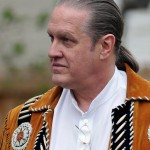 Strange Fire by John MacArthur is basically an attack on anything and everything related to the Charismatic Movement and the various movements descended from it, as if the whole of it were composed of one monolithic set of doctrines and practices that all of us espouse. It invalidates anything that smacks of the supernatural or of emotion freely expressed in God’s presence. MacArthur pours his vitriol – and I mean vitriol – through the filter of his own prejudices and theological presuppositions in a way that blinds him to the differences between the various movements within the charismatic stream and causes him to deny the existence of the majority of us who do not agree with or practice the abuses he objects to. In doing so he ignores or reinterprets, through very poor exegesis, the clear teaching of much of the Scripture as well. [Read more]
Strange Fire by John MacArthur is basically an attack on anything and everything related to the Charismatic Movement and the various movements descended from it, as if the whole of it were composed of one monolithic set of doctrines and practices that all of us espouse. It invalidates anything that smacks of the supernatural or of emotion freely expressed in God’s presence. MacArthur pours his vitriol – and I mean vitriol – through the filter of his own prejudices and theological presuppositions in a way that blinds him to the differences between the various movements within the charismatic stream and causes him to deny the existence of the majority of us who do not agree with or practice the abuses he objects to. In doing so he ignores or reinterprets, through very poor exegesis, the clear teaching of much of the Scripture as well. [Read more]
John MacArthur’s Strange Fire, Reviewed by Eddie L. Hyatt
![hyatt_1-140x205[1]](http://pneumareview.com/wp-content/uploads/2013/10/hyatt_1-140x2051.gif) As a life-long Pentecostal-Charismatic, I recommend that every Pentecostal-Charismatic leader read Strange Fire by John MacArthur. I say this because we need to see how the bizarre “spiritual” behavior and doctrinal extremes by some in our movement are viewed by those on the outside and are used to whitewash the entire movement. We have done a very poor job of addressing these problems from within, so I do not doubt that God has raised up a voice that is fundamentally opposed to our movement to address these extremes. If God could use a pagan Babylonian king to discipline his people Israel for their sins (Jeremiah 25:8-11), could he not use a merciless fundamentalist preacher to point out our shortcomings? [Read more]
As a life-long Pentecostal-Charismatic, I recommend that every Pentecostal-Charismatic leader read Strange Fire by John MacArthur. I say this because we need to see how the bizarre “spiritual” behavior and doctrinal extremes by some in our movement are viewed by those on the outside and are used to whitewash the entire movement. We have done a very poor job of addressing these problems from within, so I do not doubt that God has raised up a voice that is fundamentally opposed to our movement to address these extremes. If God could use a pagan Babylonian king to discipline his people Israel for their sins (Jeremiah 25:8-11), could he not use a merciless fundamentalist preacher to point out our shortcomings? [Read more]
MORE on the TOPIC:
Tim Challies: Lessons Learned at Strange Fire
Adrian Warnock: Strange Fire – A Charismatic Response to John MacArthur
ALEX MURASHKO: MacArthur Continues Case Against Charismatic Movement at ‘Strange Fire’
Alan Smith: SOME THOUGHTS IN RESPONSE TO THE STRANGE FIRE CONTROVERSY
SAMUEL RODRIGUEZ: John MacArthur Suffers From Spiritual, Cultural and Theological Myopia
Joela Barker: A Response to John MacArthur’s Strange Fire Conference
MICHAEL BROWN: A Final Appeal to Pastor MacArthur on the Eve of His ‘Strange Fire’ Conference
Sarah Pulliam Bailey: John MacArthur vs. Mark Driscoll: Megachurch pastors clash
Benjamin Robinson: Strange Fire? A Response to John MacArthur
CREDO HOUSE: WHY JOHN MACARTHUR MAY BE LOSING HIS VOICE
Presenting at the Society for Pentecostal Studies in Seattle Pacific University on “Historical and Doctrinal Formation of Holiness Teachings and Praxis among Bulgarian Pentecostals” (Part 1)
March 10, 2013 by Cup&Cross
Filed under News, Publication, Research
Presenting at the Society for Pentecostal Studies in Seattle on “Historical and Doctrinal Formation of Holiness Teachings and Praxis among Bulgarian Pentecostals” (Part 1)



